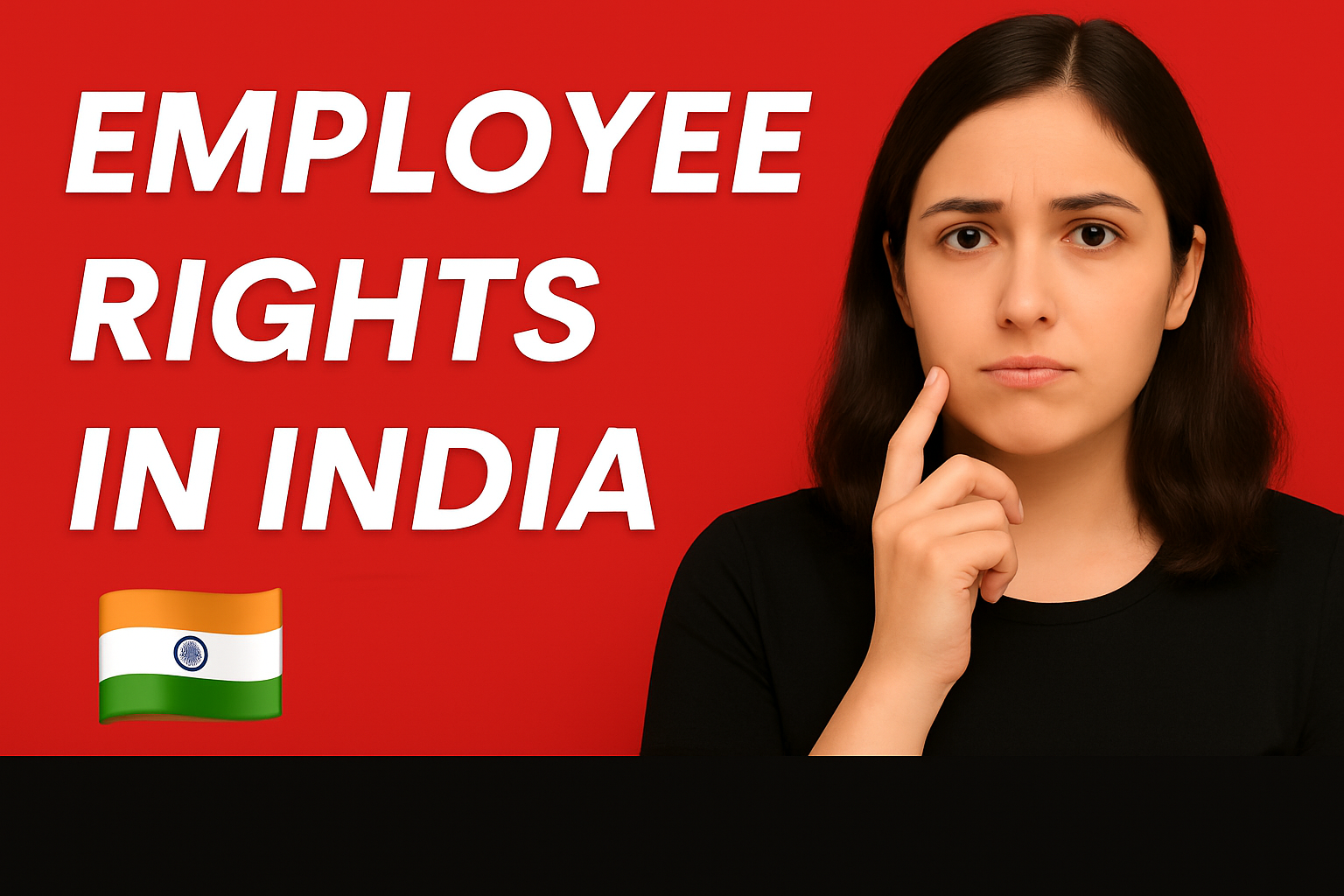Understand employee rights in India, including legal protections for wages, safety, maternity leave, and more. Learn how to safeguard your rights at the workplace.
Table of Contents
As an employee in India, you have rights that protect you at the workplace. Whether you’re a fresher, a senior professional, or a gig worker, knowing your employee rights in India is essential to avoid exploitation and ensure a fair, healthy working environment.
In this guide, we’ll break down the most important rights every employee should know and how to exercise them effectively. Let’s dive in! 💥
📜 What Are Employee Rights in India?
Employee rights are the legal, ethical, and professional protections that safeguard the interests of employees in the workplace. These rights cover everything from pay and working hours to protection from discrimination and health and safety. 🛡️
🏢 Major Laws That Protect Employee Rights in India
India has several laws that safeguard employees, and understanding these can be a game-changer for your career. Here are the key ones:
1. The Industrial Disputes Act, 1947
This law governs the rights of workers in industries, ensuring:
- Protection from unfair dismissal
- Minimum wages and compensation
- Legal procedures for layoffs or retrenchment
2. The Employees’ Provident Fund (EPF) Act, 1952
Under the EPF Act, employers must contribute a percentage of the employee’s salary to the Provident Fund (PF). This ensures:
- Retirement benefits
- Insurance and financial security
3. The Payment of Gratuity Act, 1972
Employees who have worked for more than 5 years in a company are entitled to gratuity (a lump sum payment) as a reward for long-term service.
4. The Shops and Establishments Act
Each state in India has its own Shops and Establishments Act, which regulates:
- Working hours
- Rest periods
- Paid leave
5. The Equal Remuneration Act, 1976
This ensures that men and women are paid equally for equal work, promoting gender equality in the workplace.
💡 Core Employee Rights in India
Here are the core rights that every employee in India should be aware of:
1. Right to Equal Pay for Equal Work
According to the Equal Remuneration Act, all employees are entitled to equal pay for equal work, irrespective of gender, caste, or religion. This is crucial for promoting workplace fairness.
💬 Pro Tip: If you feel you’re not getting paid fairly for the same work as your peers, it’s time to raise your concerns with HR or your superior.
2. Right to a Safe and Healthy Work Environment
Every employer must ensure that the workplace adheres to health and safety standards. This includes:
- Proper sanitation
- Safe working conditions
- Access to clean drinking water
In case of workplace injuries, employees are entitled to compensation and medical benefits.
3. Right to Paid Leave
The Factories Act, 1948, and Shops and Establishments Act provide employees with the right to:
- Earned leave (annual paid leave)
- Sick leave
- Casual leave
You are entitled to leave even if you don’t use it in a year – it’s your right!
4. Right to Protection Against Discrimination
Employees cannot be discriminated against based on:
- Gender
- Race
- Caste
- Religion
- Disability
This is enforced through the Equal Remuneration Act and other anti-discrimination laws.
5. Right to Privacy
Your employer cannot invade your personal space or personal data. If your company monitors your emails, phone calls, or internet usage, it must be clearly stated in the employee handbook or agreement.
🔒 Your Privacy Matters! Always ensure the company policies respect your personal rights.
6. Right to Maternity Leave
Under the Maternity Benefit Act, female employees are entitled to 26 weeks of paid maternity leave. This is one of the most significant rights for working mothers, ensuring their health and well-being during pregnancy.
👶 Expecting a baby? Don’t forget to check the maternity benefits offered by your company!
7. Right to Form Unions
Employees have the right to form or join trade unions to protect their interests and negotiate better working conditions, pay, and benefits. The Trade Union Act protects this right.
🔨 What Happens If My Rights Are Violated?
If your employee rights are violated, you can:
- File a Complaint with HR: Most companies have internal grievance redressal mechanisms.
- Approach a Labour Officer or Labour Court: For violations of labor laws, you can approach a labour court or tribunal.
- Contact a Legal Professional: In serious cases, seek help from a lawyer specializing in labor laws.
⚖️ Know your rights and fight for them!
💬 Real-Life Scenario
Ravi, a marketing executive at a mid-sized company, was working overtime regularly but wasn’t receiving overtime pay as per the law. Ravi felt his rights were being violated.
After speaking with HR and understanding the Labor Laws on overtime, he sent a formal complaint. He received a fair overtime pay and an apology from management for the mistake.
📚 Conclusion
Employee rights in India are designed to protect you from unfair treatment, discrimination, and unsafe working conditions. Whether it’s equal pay, paid leave, or right to privacy, being aware of these rights is crucial for maintaining a healthy work-life balance and job satisfaction.
Remember:
- Always read your employment contract carefully
- Speak up if your rights are violated – you have the law on your side!
